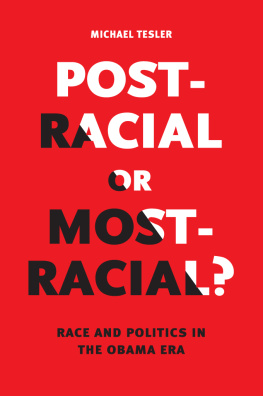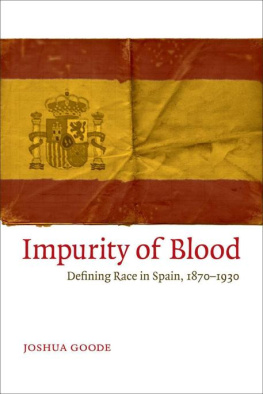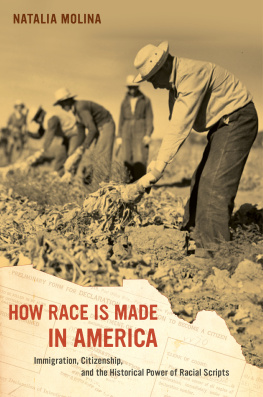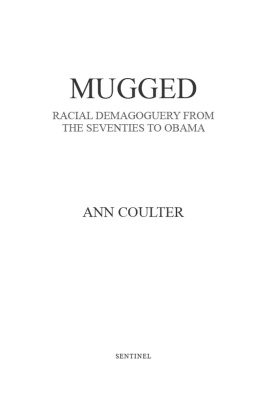Recovering History, Constructing Race
The Joe R. and Teresa Lozano Long Series in Latin American and Latino Art and Culture
RECOVERING HISTORY, CONSTRUCTING RACE
The Indian, Black, and White Roots of Mexican Americans
by Martha Menchaca


previously appeared in Menchaca 1993, Chicano Indianism: A Historical Account of Racial Repression in the United States, American Ethnologist 20 (3): 583603.
Portions of the history of schooling in the Southwest discussed in appeared in an earlier version as The Treaty of Guadalupe Hidalgo and the Racialization of the Mexican Population, in The Elusive Quest for Equality: 150 Years of Chicano/Chicana Education, ed. Jos F. Moreno (Cambridge, Mass.: Harvard Educational Review, 1999), pp. 329. Copyright 1999 by the President and Fellows of Harvard College. All rights reserved.
Copyright 2001 by the University of Texas Press
All rights reserved
Printed in the United States of America
Third paperback printing, 2005
Requests for permission to reproduce material from this work should be sent to Permissions, University of Texas Press, P.O. Box
7819, Austin, TX 787137819.
www.utexas.edu/utpress/about/bpermission.html
 The paper used in this book meets the minimum requirements of ANSI/NISO Z39.48-1992 (R1997) (Permanence of Paper).
The paper used in this book meets the minimum requirements of ANSI/NISO Z39.48-1992 (R1997) (Permanence of Paper).
Library of Congress Cataloging-in-Publication Data
Menchaca, Martha.
Recovering history, constructing race : the Indian, black, and white roots of Mexican Americans / by Martha Menchaca. 1st ed.
p. cm.
Includes bibliographical references (p. ) and index.
ISBN 0-292-75254-7 (pbk. : alk. paper)
1. Mexican AmericansRace identity. 2. Mexican AmericansEthnic identity. 3. Mexican AmericansHistory. 4. Racially mixed peopleUnited StatesHistory. 5. United StatesRace relations. 6. United StatesEthnic relations. 7. RacismUnited StatesHistory. 8. United StatesRelationsMexico. 9. MexicoRelationsUnited States. I. Title.
E184.M5 M46 2001
973.046872dc21 2001033309
For my family
Contents
Illustrations
Maps
Photographs
Acknowledgments
In this book I examine the racial history of the Mexican Americans. It is the culmination of many years of historical research. One of the major theoretical frameworks influencing my work has been Michael Omi and Howard Winants theory of racialization. In weaving this anthropological history, I hope to illustrate that knowledge of history can be used to understand our racial present. I would like to take this opportunity to express my thanks to archaeologist Fred Valdez, who in many of our conversations helped me theorize the relations between land and race. I am also indebted to historian Ricardo Romo, who in the initial conceptualization of this book shared valuable insights into the Black heritage of the Mexican Americans. I am indebted to Diego Vigil, who over the years read my manuscripts and encouraged me to continue my historical research. I am also grateful to the National Research Council/Ford Foundation Postdoctoral Program for Minorities for the financial support I received in the early years of this research project. I extend my appreciation to the Center for Mexican American Studies at the University of Texas at Austin for the financial support I received to visit library archives and to the University Co-operative Society Subvention Program for funds used to complete this book.
I want to thank my husband, Richard R. Valencia, my sisters-in-law, Betty Valencia-Cruz and Martha Gonzalez, and my niece, Elena Gonzalez, for allowing me to use their family histories to exemplify how oral traditions merge history and ethnography.
Recovering History, Constructing Race
Introduction
In this book it is my intent to write about the Mexican American peoples Indian, White, and Black racial history. In doing so, I offer an interpretive historical analysis of the experiences of the Mexican Americans ancestors in Mexico and the United States. This analysis begins with the Mexican Americans prehistoric foundations and continues into the late twentieth century. My focus, however, is on exploring the legacy of racial discrimination that was established in the aftermath of the Spanish conquest and was later intensified by the United States government when, in 1848, it conquered northern Mexico (presently the U.S. Southwest) and annexed it to the United States (Menchaca 1999:3). The central period of study ranges from 1570 to 1898.
Though my interpretive history revisits many well-known events, it differs from previous histories on Mexican Americans and on the American Southwest because the central thread of my analysis is race relations, an area of study that is often accorded only secondary significance and generally subsumed under economic or nation-based interpretations. It also differs because I include Blacks as important historical actors, rather than denying their presence in the history of the Mexican Americans. Finally, as part of this analysis I demonstrate that racial status hierarchies are often structured upon the ability of one racial group to deny those who are racially different access to owning land. This process leads to the low social prestige and impoverishment of the marginalized. I close my analysis with commentaries on contemporary United States race relations and auto/ethnographic observations of Mexican American indigenism. Auto/ethnography is used as a method to illustrate how historical events influence racial identity.
This form of intellectual inquiry emerged from my conversations with archaeologist Fred Valdez. In 1986 Fred and I were both hired as assistant professors in the Anthropology Department at the University of Texas at Austin. It was the first time that I had met a Mexican American archaeologist. We were both fascinated by the ethnohistory of the indigenous peoples of the Americas and shared the unconventional view that Mexican Americans were part of the indigenous peoples of the American Southwest. Following endless conversations on the indigenous heritage of the Mexican Americans, we decided to study the indigenous groups of the Southwest that had been conquered by Spain and Mexico. Our objective was to identify the groups that had become subjects of Spain and, later, citizens of Mexico. This research was used to prepare an undergraduate class on the Indigenous Heritage of the Mexican Americans. We were pleasantly surprised that our class became very popular, as evidenced by the large enrollments. In general, students were interested in knowing about their heritage, while many others were interested in seeking specific information about the mission Indians from whom they were descended.
For me, this academic endeavor converged with the publication of Michael Omi and Howard Winants classic book Racial Formation in the United States: From the 1960s to the 1980s (1986). Their work influenced me to reassess the significance of studying the racial heritage of the Mexican Americans, given that my interest until that point had been solely to outline their indigenous ancestry. According to Omi and Winant, the significance of studying race is not to analyze the biological aspect of a peoples heritage, but rather to understand the politics and processes of racial categorization. They urgently call upon social scientists to study race as a central source of societal organization, because in multiracial societies race has been used historically by those in power to share social and economic privileges with only those people who are racially similar to themselves. Omi and Winant do not urge scholars to explore the origins or psychology of this inclusive-exclusive behavior, but rather to provide a historical context, showing how those in power use race to rationalize the distribution of wealth.
Next page







 The paper used in this book meets the minimum requirements of ANSI/NISO Z39.48-1992 (R1997) (Permanence of Paper).
The paper used in this book meets the minimum requirements of ANSI/NISO Z39.48-1992 (R1997) (Permanence of Paper).